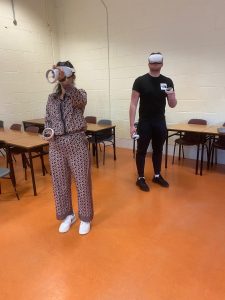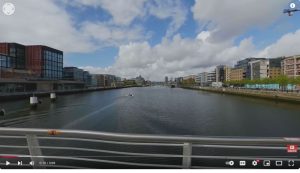6 Virtual Reality in Hospitality Management – New Ways of Engaging
Sandra Griselain
Programme: Bachelor of Arts (Honours) in Hospitality Management (with International Placement)
Module: Work Placement
Year: 2
Aim: to introduce Tourism Management students to a variety of learning experiences within Tourism context in preparation for their work placement.

Learning Outcomes linked to the VR activity
- Identify good industrial practice and contribute to delivery of same while learning to appreciate work and its function in the economy.
- Identify the personal skills and employability skills required in the workplace. With this type of learning outcome, the learner will understand concepts, rules or procedures of workplace.
- Critically evaluate and appraise their work placement in the light of previously stated goals, personal qualities and prior career aspirations.
Description of the VR activity
Virtual Reality headsets were used during a one-hour class. Students were introduced to the VR headsets (Meta Quest 2) and following an onboarding activity, they were given the opportunity to immerse themselves in one of the following three experiences:
- YouTube 360-degree video on Dublin (thumbnail and link below)
- Virtual Speech interview preparation (an immersive soft skills training platform: https://virtualspeech.com/)
- Historical Tourism (Anne Frank Immersive Experience)
Most students in the group tried out at least two of the three options and were asked to evaluate the experience by considering specific questions. The purpose of this activity was two-fold: to consider the VR experience in the context of their module and to reflect on the use of immersive experience in the broader context of their chosen profession.

- How effective is the tour in showcasing the capital city?
- Was it a user-friendly experience?
- What did you learn/do you remember about the tour?
- Can you think of an application for this type of promotional media?
Student Reflections:
“I found it really interesting the see my surroundings in such a different way.”
“VR is far more in depth and detailed than a still picture. It is more engaging and grabs your attention. The visuals aid learning and give us a greater understanding of the topics discussed”.
“I think it has lots of potential in the hospitality industry for tours.”
Lecturer’s Reflections:
“Incorporating VR headsets into the placement module, which is aimed at preparing students for work in the Irish hospitality industry, offers numerous pedagogical benefits. For lecturers, VR offers a powerful way to enhance both the practical and theoretical aspects of hospitality education and is an engaging way to prepare students for real-world work placements. By providing immersive experiences that simulate real-world scenarios, VR helps students build essential skills & competencies, developing essential soft skills relating to customer service, teamwork, cultural awareness and management functions, all while offering a platform for personalized feedback and self-reflection. It facilitates cross-departmental learning, where students are exposed to different functions within a hotel. This approach helps students develop a holistic understanding of how a hotel operates. It equips students with the confidence and expertise they need to succeed in their work placements and thrive in the dynamic hospitality industry.”

